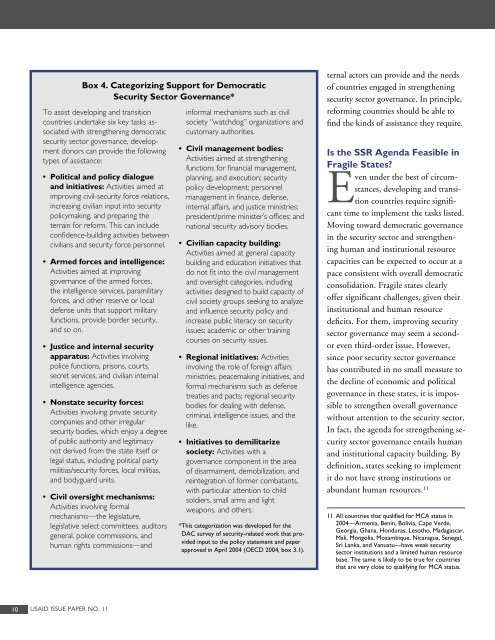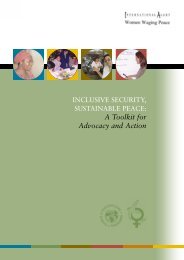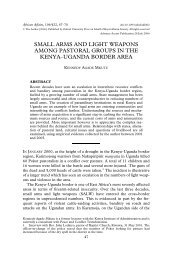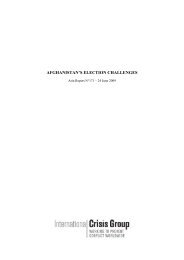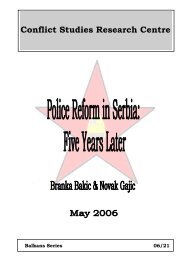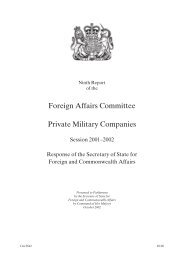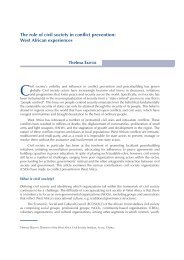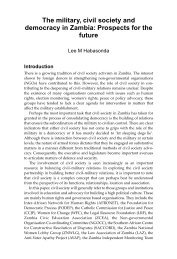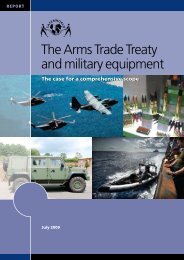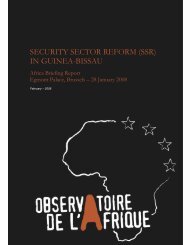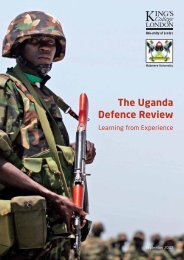promoting security sector reform in fragile states - GFN-SSR
promoting security sector reform in fragile states - GFN-SSR
promoting security sector reform in fragile states - GFN-SSR
You also want an ePaper? Increase the reach of your titles
YUMPU automatically turns print PDFs into web optimized ePapers that Google loves.
Box 4. Categoriz<strong>in</strong>g Support for Democratic<br />
Security Sector Governance*<br />
To assist develop<strong>in</strong>g and transition<br />
countries undertake six key tasks associated<br />
with strengthen<strong>in</strong>g democratic<br />
<strong>security</strong> <strong>sector</strong> governance, development<br />
donors can provide the follow<strong>in</strong>g<br />
types of assistance:<br />
• Political and policy dialogue<br />
and <strong>in</strong>itiatives: Activities aimed at<br />
improv<strong>in</strong>g civil-<strong>security</strong> force relations,<br />
<strong>in</strong>creas<strong>in</strong>g civilian <strong>in</strong>put <strong>in</strong>to <strong>security</strong><br />
policymak<strong>in</strong>g, and prepar<strong>in</strong>g the<br />
terra<strong>in</strong> for <strong>reform</strong>. This can <strong>in</strong>clude<br />
confidence-build<strong>in</strong>g activities between<br />
civilians and <strong>security</strong> force personnel.<br />
• Armed forces and <strong>in</strong>telligence:<br />
Activities aimed at improv<strong>in</strong>g<br />
governance of the armed forces,<br />
the <strong>in</strong>telligence services, paramilitary<br />
forces, and other reserve or local<br />
defense units that support military<br />
functions, provide border <strong>security</strong>,<br />
and so on.<br />
• Justice and <strong>in</strong>ternal <strong>security</strong><br />
apparatus: Activities <strong>in</strong>volv<strong>in</strong>g<br />
police functions, prisons, courts,<br />
secret services, and civilian <strong>in</strong>ternal<br />
<strong>in</strong>telligence agencies.<br />
• Nonstate <strong>security</strong> forces:<br />
Activities <strong>in</strong>volv<strong>in</strong>g private <strong>security</strong><br />
companies and other irregular<br />
<strong>security</strong> bodies, which enjoy a degree<br />
of public authority and legitimacy<br />
not derived from the state itself or<br />
legal status, <strong>in</strong>clud<strong>in</strong>g political party<br />
militias/<strong>security</strong> forces, local militias,<br />
and bodyguard units.<br />
• Civil oversight mechanisms:<br />
Activities <strong>in</strong>volv<strong>in</strong>g formal<br />
mechanisms—the legislature,<br />
legislative select committees, auditors<br />
general, police commissions, and<br />
human rights commissions—and<br />
<strong>in</strong>formal mechanisms such as civil<br />
society “watchdog” organizations and<br />
customary authorities.<br />
• Civil management bodies:<br />
Activities aimed at strengthen<strong>in</strong>g<br />
functions for f<strong>in</strong>ancial management,<br />
plann<strong>in</strong>g, and execution; <strong>security</strong><br />
policy development; personnel<br />
management <strong>in</strong> f<strong>in</strong>ance, defense,<br />
<strong>in</strong>ternal affairs, and justice m<strong>in</strong>istries;<br />
president/prime m<strong>in</strong>ister’s offices; and<br />
national <strong>security</strong> advisory bodies.<br />
• Civilian capacity build<strong>in</strong>g:<br />
Activities aimed at general capacity<br />
build<strong>in</strong>g and education <strong>in</strong>itiatives that<br />
do not fit <strong>in</strong>to the civil management<br />
and oversight categories, <strong>in</strong>clud<strong>in</strong>g<br />
activities designed to build capacity of<br />
civil society groups seek<strong>in</strong>g to analyze<br />
and <strong>in</strong>fluence <strong>security</strong> policy and<br />
<strong>in</strong>crease public literacy on <strong>security</strong><br />
issues; academic or other tra<strong>in</strong><strong>in</strong>g<br />
courses on <strong>security</strong> issues.<br />
• Regional <strong>in</strong>itiatives: Activities<br />
<strong>in</strong>volv<strong>in</strong>g the role of foreign affairs<br />
m<strong>in</strong>istries, peacemak<strong>in</strong>g <strong>in</strong>itiatives, and<br />
formal mechanisms such as defense<br />
treaties and pacts; regional <strong>security</strong><br />
bodies for deal<strong>in</strong>g with defense,<br />
crim<strong>in</strong>al, <strong>in</strong>telligence issues, and the<br />
like.<br />
• Initiatives to demilitarize<br />
society: Activities with a<br />
governance component <strong>in</strong> the area<br />
of disarmament, demobilization, and<br />
re<strong>in</strong>tegration of former combatants,<br />
with particular attention to child<br />
soldiers, small arms and light<br />
weapons, and others.<br />
* This categorization was developed for the<br />
DAC survey of <strong>security</strong>-related work that provided<br />
<strong>in</strong>put to the policy statement and paper<br />
approved <strong>in</strong> April 2004 (OECD 2004, box 3.1).<br />
ternal actors can provide and the needs<br />
of countries engaged <strong>in</strong> strengthen<strong>in</strong>g<br />
<strong>security</strong> <strong>sector</strong> governance. In pr<strong>in</strong>ciple,<br />
<strong>reform</strong><strong>in</strong>g countries should be able to<br />
f<strong>in</strong>d the k<strong>in</strong>ds of assistance they require.<br />
Is the <strong>SSR</strong> Agenda Feasible <strong>in</strong><br />
Fragile States?<br />
Even under the best of circumstances,<br />
develop<strong>in</strong>g and transition<br />
countries require significant<br />
time to implement the tasks listed.<br />
Mov<strong>in</strong>g toward democratic governance<br />
<strong>in</strong> the <strong>security</strong> <strong>sector</strong> and strengthen<strong>in</strong>g<br />
human and <strong>in</strong>stitutional resource<br />
capacities can be expected to occur at a<br />
pace consistent with overall democratic<br />
consolidation. Fragile <strong>states</strong> clearly<br />
offer significant challenges, given their<br />
<strong>in</strong>stitutional and human resource<br />
deficits. For them, improv<strong>in</strong>g <strong>security</strong><br />
<strong>sector</strong> governance may seem a secondor<br />
even third-order issue. However,<br />
s<strong>in</strong>ce poor <strong>security</strong> <strong>sector</strong> governance<br />
has contributed <strong>in</strong> no small measure to<br />
the decl<strong>in</strong>e of economic and political<br />
governance <strong>in</strong> these <strong>states</strong>, it is impossible<br />
to strengthen overall governance<br />
without attention to the <strong>security</strong> <strong>sector</strong>.<br />
In fact, the agenda for strengthen<strong>in</strong>g <strong>security</strong><br />
<strong>sector</strong> governance entails human<br />
and <strong>in</strong>stitutional capacity build<strong>in</strong>g. By<br />
def<strong>in</strong>ition, <strong>states</strong> seek<strong>in</strong>g to implement<br />
it do not have strong <strong>in</strong>stitutions or<br />
abundant human resources. 11<br />
11 All countries that qualified for MCA status <strong>in</strong><br />
2004—Armenia, Ben<strong>in</strong>, Bolivia, Cape Verde,<br />
Georgia, Ghana, Honduras, Lesotho, Madagascar,<br />
Mali, Mongolia, Mozambique, Nicaragua, Senegal,<br />
Sri Lanka, and Vanuatu—have weak <strong>security</strong><br />
<strong>sector</strong> <strong>in</strong>stitutions and a limited human resource<br />
base. The same is likely to be true for countries<br />
that are very close to qualify<strong>in</strong>g for MCA status.<br />
10 USAID ISSUE PAPER NO. 11


